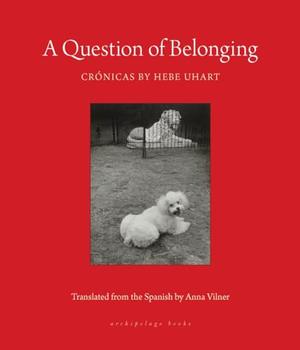
Crónicas
by Hebe Uhart
25 Crónicas – uniquely Latin American short stories – from a master of the form, a star heralded alongside Samanta Schweblin and Mariana Enríquez for blending insight, honesty, and humor
Uhart reinvigorates our desire to connect with other people, to love the world, to laugh in the face of bad intentions, and to look again, more closely: from lapwings, road-side pedicures, and the overheard conversations of nurses and their patients, to Goethe and the work of the Bolivian director Jorge Sanjinés.
"It was a year of great discovery for me, learning about these people and their homes," Hebe Uhart writes in the opening story of A Question of Belonging, a collection of texts that traverse Argentina, Paraguay, Brazil, Spain, and beyond. Discoveries sprout and flower throughout Uhart's oeuvre, but nowhere more so than in her crónicas, Uhart's preferred method of storytelling by the end of her life. For Uhart, the crónica meant going outside, meeting others. It also allowed the mingling of precise, factual reportage and the slanted, symbolic narrative power of literature.
Here, Uhart opens the door on all kinds of people. We meet an eccentric priest who conducts experiments down by the riverside hoping to land on a cure for cancer; a queenly (read: beautiful and relentlessly indolent) teenage girl; a cacique of the Pueblo Nación Charrúa clan, who tells her of indigenous customs and histories.
She writes with characteristic slyness. In the last lines of the title story, Uhart writes, "And I left, whistling softly." Wherever she may have gone, we are left with the wish we could follow alongside.
"Over a career spanning five decades, Uhart published nearly two dozen stories, novels, travelogues, and tales, all of which exude the author's characteristically bright insight and sense of attentive amusement ... Vilner's thoughtful translation does much-deserved justice to Uhart's cleareyed, boundless curiosity. An exemplary compendium of brief glimpses into the quotidian concerns of everyday South Americans." —Kirkus Reviews (starred review)
"Superb ... Language fascinated Uhart. She avidly collected local expressions and phrases, particularly Creole ones. Her 'tender and playful' voice conjures the essence of people and places in elegantly spare descriptive detail." —Booklist
"Seemingly naïve but tremendously sharp, Hebe Uhart's vision is one that could belong to a child, but a child who has up her sleeve the reflective tools of an adult." —The Paris Review
"Paul Klee famously described drawing as taking a line for a walk and the stories of Hebe Uhart share that spirit, that magic. Deceptively simple, also philosophical, Uhart's work is brilliant and companionable." —Rivka Galchen, author of Everyone Knows Your Mother Is a Witch
"There is a way to capture the movements of reality, without a violent fight, that's nevertheless powerful. With her singular voice, Hebe Uhart is constantly seen, heard and present in her crónicas, and yet there's a grace in the way she occupies the space she's meditating upon; she is at once too vast and too small for autobiography. Anna Vilner's translation is eloquently luminous." —Claudia Durastanti, author of Strangers I Know
This information about A Question of Belonging was first featured
in "The BookBrowse Review" - BookBrowse's membership magazine, and in our weekly "Publishing This Week" newsletter. Publication information is for the USA, and (unless stated otherwise) represents the first print edition. The reviews are necessarily limited to those that were available to us ahead of publication. If you are the publisher or author and feel that they do not properly reflect the range of media opinion now available, send us a message with the mainstream reviews that you would like to see added.
Any "Author Information" displayed below reflects the author's biography at the time this particular book was published.
Born in 1936 in the outskirts of Buenos Aires, Hebe Uhart is one of the most original voices in the Spanish language. She is best known for her short stories exploring the lives of ordinary characters in small towns. Her Collected Stories won the Buenos Aires Bookfair Prize (2010), and she received Argentina's National Endowment of the Arts Prize (2015) for her trajectory as well as the Manuel Rojas Ibero-American Narrative Prize (2017). Her writing, which presents a characteristically criollo language, is identified with a quirky, understated syntax that constructs an odd perspective on the quotidian life in South America. Uhart died in 2018.
Anna Vilner is a Russian-born American translator. She holds an MFA from the University of Arkansas and is a PhD student in Comparative Literature at the University of Texas-Austin. Her translations can be found in World Literature Today, The Massachusetts Review, Columbia Journal, and The Common.
Your guide toexceptional books
BookBrowse seeks out and recommends the best in contemporary fiction and nonfiction—books that not only engage and entertain but also deepen our understanding of ourselves and the world around us.